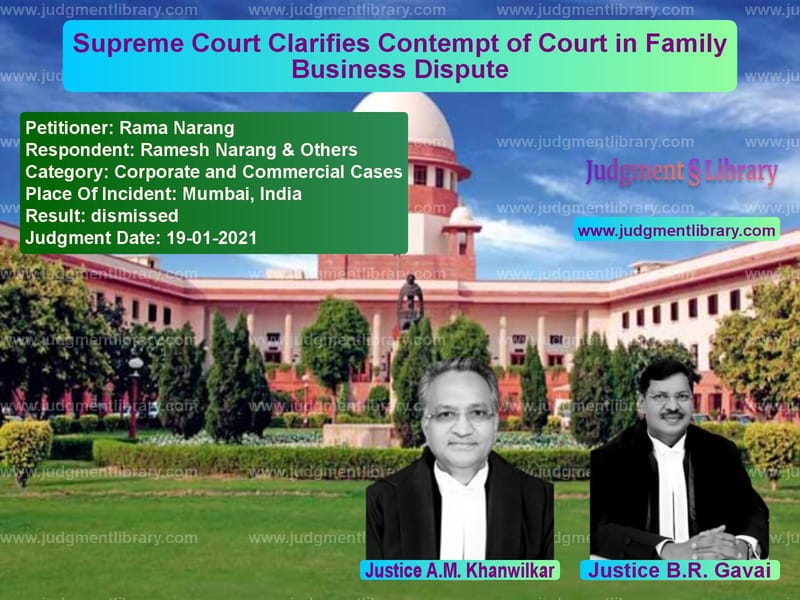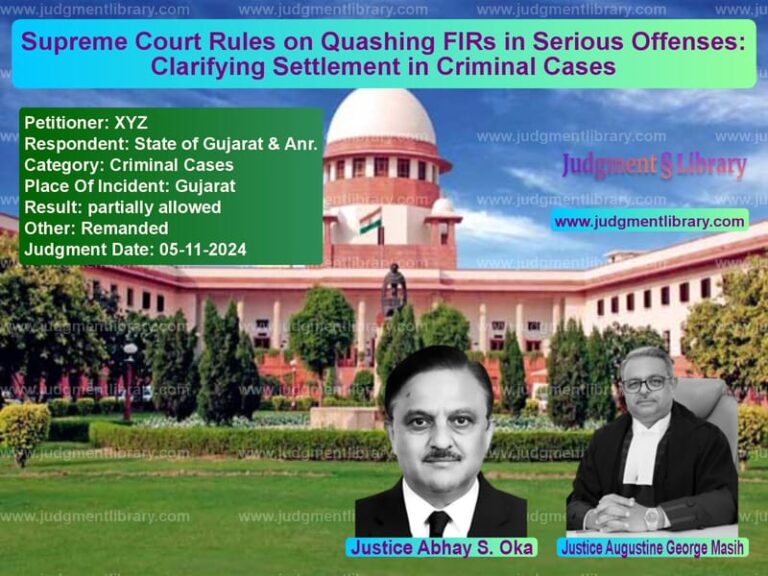Supreme Court Clarifies Contempt of Court in Family Business Dispute
The Supreme Court of India, in the case of Rama Narang vs. Ramesh Narang & Others, addressed a long-standing family business dispute that escalated into multiple legal battles, including contempt proceedings. The judgment clarifies the scope of contempt jurisdiction, the importance of compliance with court orders, and the obligations of parties involved in corporate governance.
Background of the Case
The dispute arose between Rama Narang, the petitioner, and his sons from his first marriage—Ramesh Narang and Rajesh Narang—over the management of Narang International Hotels Ltd. (NIHL). The conflict, spanning decades, led to multiple court cases, including civil suits, arbitration proceedings, and company law disputes.
The litigation history includes:
- Several civil suits in the Bombay High Court.
- Company Petition No. 28 of 1992 before the Company Law Board (CLB).
- Arbitration proceedings involving the family business.
- Multiple contempt petitions alleging non-compliance with court orders.
Legal Issues Raised
- Whether the respondents (Ramesh and Rajesh) violated court orders and engaged in contempt of court.
- Whether the appointment of a Facilitator by the Company Law Board (CLB) conflicted with the Supreme Court’s earlier rulings.
- Whether the petitioner’s refusal to cooperate led to business deadlock.
- Whether contempt proceedings could be used as a means to settle business disputes.
Petitioner’s Arguments (Rama Narang)
- The respondents deliberately violated the consent terms recorded in the Supreme Court’s orders dated December 12, 2001, and January 8, 2002.
- Decisions regarding NIHL were made without his consent, contrary to the court-mandated joint management structure.
- The CLB’s appointment of a Facilitator undermined the Supreme Court’s orders and was, therefore, an act of contempt.
- The respondents continued to exclude him from business operations despite a clear Supreme Court ruling against such exclusion.
Respondents’ Arguments (Ramesh & Rajesh Narang)
- The petitioner obstructed business operations by refusing to sign necessary documents and cooperate in management decisions.
- To ensure business continuity, they had to seek intervention from the CLB under Sections 397, 398, and 403 of the Companies Act.
- The appointment of a Facilitator by the CLB was a lawful measure to prevent company mismanagement.
- They complied with the Supreme Court’s orders but had to act in the best interest of NIHL and its employees.
Supreme Court’s Observations
The Supreme Court extensively examined the prior orders and the contempt allegations. The Court made the following key observations:
“Merely taking recourse to the statutory remedy available under the Companies Act cannot be termed as contempt of court. A party has a right to seek legal remedies available under the law.”
The Court held that the respondents had approached the CLB as a legitimate means to resolve governance disputes and that such actions did not amount to contempt.
Additionally, the Court found that:
- The petitioner’s refusal to cooperate had contributed to the business deadlock.
- The CLB’s Facilitator was lawfully appointed, and its orders had not been challenged in any appellate forum.
- The principle of contempt requires willful and deliberate disobedience, which was not established in this case.
Final Judgment
- The Supreme Court dismissed the contempt petition, holding that no willful or intentional violation of its orders had been established.
- The Court advised the parties to seek resolution through statutory forums rather than contempt proceedings.
- The Court declined to exercise powers under Article 142 of the Constitution to enforce business decisions.
- It directed that the ongoing business management mechanism, including the Facilitator appointed by the CLB, should continue unless set aside by a competent authority.
Implications of the Judgment
The ruling has far-reaching implications for corporate governance and family business disputes:
- Clarification on Contempt Jurisdiction: The Court reaffirmed that contempt proceedings are not a substitute for business dispute resolution.
- Corporate Governance Principles: The judgment highlights the importance of structured decision-making and adherence to legal remedies.
- Role of Facilitators in Business Disputes: The Court upheld the CLB’s decision to appoint a Facilitator, reinforcing the importance of neutral intervention in corporate deadlocks.
- Statutory Remedies Prevail: The ruling confirms that parties should seek relief through appropriate statutory forums rather than attempting to use contempt proceedings as a business strategy.
Conclusion
The Supreme Court’s decision in Rama Narang vs. Ramesh Narang & Others reinforces the principle that contempt jurisdiction is limited to willful disobedience of court orders. The ruling provides crucial clarity on corporate governance issues, emphasizing that family disputes involving business management should be resolved through statutory mechanisms rather than contempt litigation. The case serves as a precedent for maintaining judicial restraint while ensuring compliance with legal frameworks.
Petitioner Name: Rama Narang.Respondent Name: Ramesh Narang & Others.Judgment By: Justice A.M. Khanwilkar, Justice B.R. Gavai.Place Of Incident: Mumbai, India.Judgment Date: 19-01-2021.
Don’t miss out on the full details! Download the complete judgment in PDF format below and gain valuable insights instantly!
Download Judgment: rama-narang-vs-ramesh-narang-&-othe-supreme-court-of-india-judgment-dated-19-01-2021.pdf
Directly Download Judgment: Directly download this Judgment
See all petitions in Company Law
See all petitions in Shareholder Disputes
See all petitions in Corporate Governance
See all petitions in Judgment by A M Khanwilkar
See all petitions in Judgment by B R Gavai
See all petitions in dismissed
See all petitions in supreme court of India judgments January 2021
See all petitions in 2021 judgments
See all posts in Corporate and Commercial Cases Category
See all allowed petitions in Corporate and Commercial Cases Category
See all Dismissed petitions in Corporate and Commercial Cases Category
See all partially allowed petitions in Corporate and Commercial Cases Category







